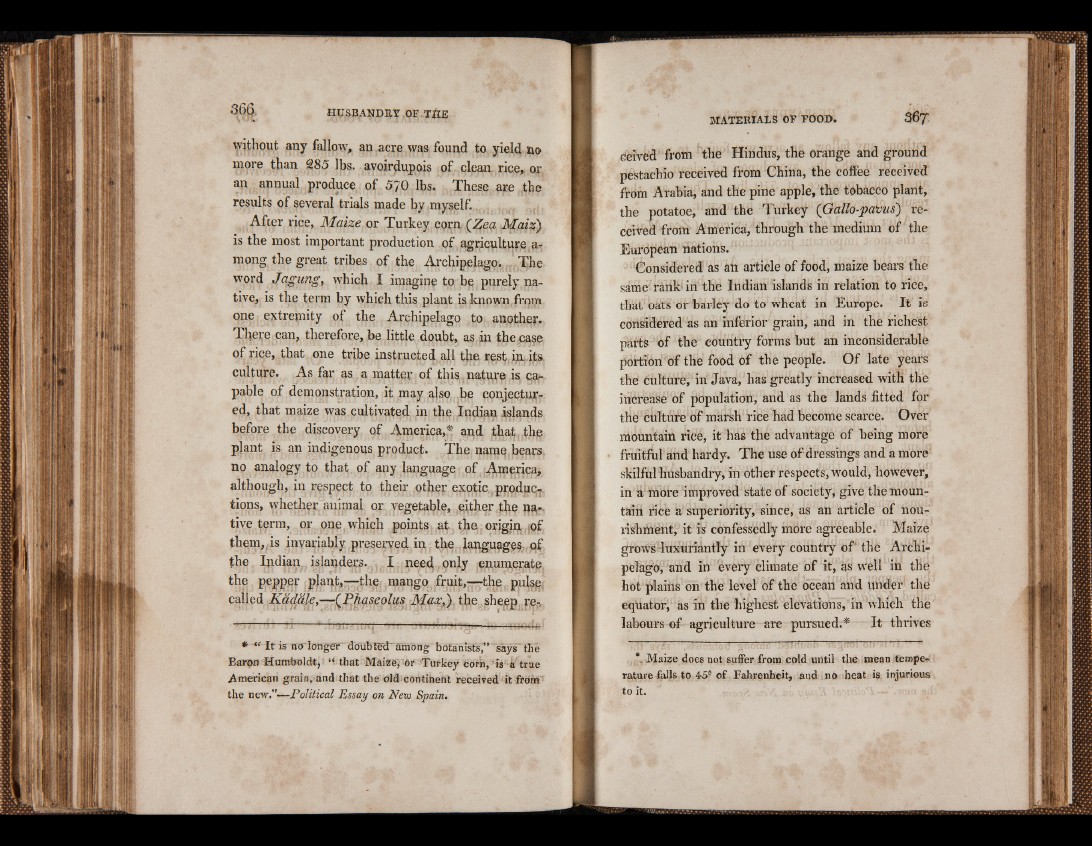
without any fallow, an acre was found to yield no
more than 285 lbs. avoirdupois of clean rice, or
an annual produce of 570 lbs. These are the
results of several trials made by myself. u
After rice, Maize or Turkey corn (JZea Maiz)
is the most important production of agriculture a-;
mong the great tribes of the Archipelago. The
word Jagung, which I imagine to be purely native,
is the term by which this plant is known from
one extremity of the Archipelago to another.
There can, therefore, be little doubt, as in the case
of rice, that one tribe instructed all the rest in. ha
culture. As far as a matter of this, nature is ear
pable of demonstration, it may also be conjectured,
that maize was. cultivated in the, Indian islands
before the discovery of America,* and that the
plant is an indigenous product. The name bears,
no analogy to that , of any language of America,
although, in respect to their ;other exofic produq-
tions, whether animal or vegetable, either the n a tive
term, or one, which points at the origm. ,pf
them,.is invariably preserved in the languages of
the Indian islanders. I need . only enumerate
the pepper t plant,—the mango,, fruit,—the, pulsp;
called Kddade^lT^aseolM, the .sheep, ra?
* “ I t is no longer doubted among botanists,” says the
Baron Humboldt, “ that Maize; or Turkey Corn, is A true
American grain, and that the old contihent received it from:
the new.”— Political Essay on Nero Spain.
reived from the Hindus, the orange and ground
pestachio received from China, the coffee received
from Arabia, and the pine apple, the tobáceo plant,
the potatoe, and the Turkey (Gallo-pavus) received
from America, through the medium of the
European nations.
Considered as an article of food, maize bears the
same’ rank in the Indian islands in relation to rice,
that oats or barley do to wheat in Europe. It is
considered as an inferior grain, and in the richest
parts of the country forms but an inconsiderable
portion of the food of the people. Of late years
the culture, in Java, has greatly increased with the
increase of population, and as the lands fitted for
the culture of marsh rice had become scarce. Over
mountain rice, it has the advantage of being more
fruitful and hardy. The use of dressings and amore'
skilful husbandry, in other respects, would, however,
in a more improved state of society, give the mountain
ricé a superiority, since, as an article of nourishment,
it is confessedly mòre agreeable. Maize
grows luxuriantly in every country of* the Archipelago,
and in every climate .of it, ás well in the,
hot plains on the level of the ocean and under' the
equator, as in the highest elevations, in which the
labours of agriculture are pursued.* It thrives
"„ Maize does not suffer from cold until the mean temperature
falls to 45° o f Fahrenheit, and no heat is injurious
to it.